Hi all, and welcome back to Conservation Realist! Today is Episode 6, and we are back to conversations, after the monologue in Episode 5. However, if you have not listened to Episode 5, I recommend you do that before this episode, because it will give you some helpful background and context for this conversation.
And this conversation is with Yin Yin Htay. She is a program officer at Point B Design + Training as well as one of the co-founders and currently the leading coordinator of the Myanmar Coastal Conservation Lab (MCCL), which is the local youth-led conservation organization operating out of Point B.
She is one of my most cherished mentees. Those original three who co-founded MCCL, including Wint Hte and Aung Naing Soe, will always be so special to me. We learned a lot together, we built a lot together, and I so admire what they've all continued on to do. So I was really happy that she was able to make time in her busy schedule to chat with me a bit.
Before going further, I'd like to express my appreciation for anyone who's following along, be that listening or reading the transcript or following the posts I put on Instagram summarizing some of this content - it means a lot to have you paying attention. And someone reached out to me on Instagram and sent a really nice message about how they appreciated the podcast and felt like it was a valuable research, and that made me feel so fantastic - especially because this is someone I'd never met before. I've had some really generous, heart-warming feedback from friends and colleagues on the podcast so far, but to have someone who I've never met take the effort to reach out really meant a lot. So thank you for that.
And you, too, can contribute to me feeling fantastic about this podcast by liking, sharing, leaving comments on the Substack site (and I want to give a shout-out to the folks I know in Myanmar who are doing a great job representing in the comments - you are the leaders so far) and of course reviews on the podcast as well.
Back to Yin Yin and some of the context for our conversation. I'm going to start with her "origin story" as related to her work in conservation, because I think it's a powerful example of someone gaining confidence and amplifying what they're able to do with that confidence.
You might remember from the previous episode that she was one of my original 3 field assistants for my postdoc in Myanmar. I was impressed with all of them. She in particular had a real strength when it came to making community members feel comfortable around her. This was evidenced when we were doing research on the Myeik Archipelago on the formation of the Locally Managed Marine Areas. We were interviewing local stakeholders on their impressions of that whole process - was it effective, was it inclusive, etc. And she was the only who the Moken women would be willing to talk to. The rest of us actually had to move out of sight before they were willing to speak to her. And she hung out with them for hours - we were getting worried, like "where is she?" - and she came back all aglow, so full of information they'd shared with her about how they'd felt marginalized in the process. And it really gave all of us some great insight as to how conservation processes can be more inclusive to groups who are already marginalized.
In that project and some of the other fieldwork we did, I was so happy with how everyone on the team was doing. I was really impressed with their skills. But, there came a day when we were starting to do data analysis, where she almost left the team. I was really concerned - did I do something as a leader to scare her off? But it turned out that she didn't feel confident in her ability to contribute to the team anymore because she didn't have a lot of experience working with computers. And this is the case for many people in Myanmar - a computer is a luxury item.
I'm really appreciative that she decided to be brave and come back despite her misgivings. Luckily, I had some extra research funding to purchase equipment, so I purchased a computer to do data analysis for my project. In addition to teaching them how to enter data in Excel, for example, I also made sure to show her how to practice on typing tutorials, for example. And she worked really hard at it, and she blossomed so much.
Fast forward to now: she is running MCCL. She's teaching people how to use computers, how to enter data and do basic data analyses, how to write reports and make presentations in PowerPoint. And she plays such an important role in contributing to the content of the projects that are designed there, in addition to her obvious strengths in the field. She is really a true leader and an effective leader. She's made MCCL feel like a family.
And in 2020, she was selected as a Youth Biodiversity Leader (YBL) for the Young Southeast Asia Leadership Initiative (YSEALI), which is funded by the US Government to promote the development of leadership skills in ASEAN nations. She was selected as one of 2 YBLs from Myanmar. And a lot of our conversation touches on how important those kinds of opportunities are.
Linking back to last episode's theme of the trickle-down effect of capacity building: one of the other young researchers at MCCL has been selected to the current cohort of YBL. And Wint Hte, one of the original MCCL founders, earned a prestigious Chevening Scholarship some years ago to get his Master's in Marine Environment Protection at Bangor University. And Aung Naing Soe is such an important leader in his community. He unfortunately had to leave the conservation field to be closer to family, but he's so active in his community and teaching youth in that community. The diversity of experiences shown even by those three shows how many ways there are to take what you've learned and to amplify it and share it with others.
We have other MCCL alumni and young researchers, Zun Pwint Oo, Zun Pyae Oo, and Nyan Lin Htet who received funding from YSEALI's Marine Accelerator Program for their "Save Irrawaddy dolphin campaign" project.
And all of this stemmed from 3 field assistants! That's pretty amazing. Honestly, these international opportunities and recognition are just the icing on the cake for the fantastic things that these young people are doing, but of course it's encouraging to get that recognition and also to have that support and those opportunities as well.
I want to bring this introduction to a close with a story about the original three, the dream team, who joined me on research in the Myeik Archipelago. One of the most formative experiences was actually in between our fieldwork, when we were in transit between villages and took a little snorkel break because Fauna & Flora International had been generous enough to loan snorkeling equipment to us. This was the first time for these three Gulf of Mottama-area locals to see clear ocean water, to see coral reefs, to be able to observe fish swimming under the water with their own eyes. That was powerful for them.
The opportunity for immersion and exploration, for seeing things with your own eyes, for observing things with some coaching about being mindful about everything you're observing - that is huge. And it's not incorporated enough when we're talking about building capacity for research in conservation. We've had great impacts from incorporating these opportunities in our internship program. For example, a group was able to go to the Philippines and learn about plastic waste and engaging with communities on plastic waste issues from the Philippines Reef and Rainforest Conservation Foundation. The trip was amazing for them, it was a life-changing trip. And they were able to come back to Myanmar and fairly autonomously design their own plastic research project as well as various educational campaigns.
And in 2019, the team presented a poster on their marine mammal work at the World Marine Mammal Conference in Barcelona. And they won the J. Stephen Leatherwood Award, which is for the best presentation relevant to conservation in Southeast Asia. This was huge! We were not expecting this. But for the team, having that appreciation for their work was so invigorating and so encouraging, and really fueled them even more to pursue their work on marine mammals in Myanmar.
OK, I've spoken enough! Let's go to a clip from the Green Touch by Soe Moe Thwin, Zyan Htet, and Min Min, and we'll come back to the conversation with Yin Yin.
[MUSIC]
T: So you just got back from marine mammal survey! The pictures look really good - except for the photo of the dolphin with the fishing gear wrapped around it.
Y: It's interesting. The one who was tangled in the net, it was an individual swimming alone, and we couldn't approach it.
T: It would be really hard to try to help it.
Y: I really missed having you! And the team they are very passionate to be there, and active, but one thing is seasickness.
T: Oh my gosh, I would've been seasick too!
Y: But we made it.
T: Good! I'm glad you could make time talk with me for this podcast. I'm really excited to chat with you about something besides urgent work matters! To start, I would love to hear you share your journey to discovering your passion for conservation.
Y: That sounds great! Actually, my passion in conservation, it's really exciting to talk about it. I came from the literature field, and I had zero background in conservation in the beginning. But one thing is that even in literature, I have learned about poems written about nature. And I love those poems a lot, and it made me love nature more and more by understanding and learning about the poems.
Since then, I've become passionate to feel the beauty of nature. But for the technical terms, "conservation," I totally didn't know about those. Luckily, after I graduated, I could join the Design Thinking class for 6 months. I could learn the Design Thinking approach and doing some research, especially social research, in the Design Thinking class. After that, I graduated the Design Thinking class, and I could join some research on Locally Managed Marine Areas in the Myeik Archipelago.
My passion started with that, I think, for conservation, because in that research, I learned the community's perspectives, their beliefs, and their difficulties. And I came to know how conservation is in fisheries, and how it's important to conserve without harming people. My passion started a little from that, and I had the chance to join mud crab research in the Gulf of Mottama. And I built skills from you supporting skills training for conservation.
My journey started with that. I became more and more interested in it.
What built my strength of passion for conservation was attending the World Marine Mammal Conference in Barcelona in 2019, because I saw a lot of people working in different fields for conservation, and I saw so much energy from there and could build networks there. I got a lot of inspiration. And my hope for working in conservation got very strong.
So my story is that I discovered my passion in conservation through those kinds of things.
T: Thank you for sharing that, Yin Yin. It's been really cool to see, not just you, but also Aung Naing Soe and Wint Hte and all of the youths you've trained over the years and the journey for each and every one of them. And that's one thing I want to really compliment you on: you're doing a really fantastic job running MCCL and helping other youths not only discover the passion that you discovered, but helping them build the skills and experiences that they need to work in the field.
I'm wondering what kind of impact have you seen from the work you've done with MCCL on the youth that you've worked with?
Y: That's a great question. From me, the best impact that I saw on the youth is that they value the communities with their heart. When working with communities, something like interviews or doing some campaign, they communicate with their heart. And they care about the community, they respect the community. That is the main thing I see from the youth.
And the other thing is they respect each other, which comes from trust building with the community. They always remember how to adapt good practices when doing some interviews in the community.
And they became physically and mentally strong in work. I assume that is the impact they get from working with me.
Another impact that I see is that they can lead. They have confidence to lead in giving trainings, in doing research in communities - they build their confidence. Because the activities I give have divided roles to lead. My inspiration comes from my supervisors like you, I have good examples from my seniors.
When I evaluate them, the result comes with that: they can lead, they have confidence when communicating with communities and in trainings.
T: That's great! And in addition to what you've seen with the youths, what are some of the most powerful things you have learned from your work on conservation in Myanmar?
Y: Some powerful things are the passion to work in conservation, and also community engagement. Engaging communities without harming them, and understanding and respecting them - this is the powerful thing that I see.
The other powerful thing that I see is youth participation. They have a lot of energy, they have time availability to work on these things, and also they have passion. Those are powerful things to do conservation with in Myanmar.
T: That's one thing that struck me when I was working there, is so many young people were really interested in doing something for the environment, but they didn't have many pathways available to them for doing that work. That's one thing that we, especially you, have been trying to do with MCCL. Can you share some of the main challenges you face in sustaining the work of MCCL? I'm asking because maybe not everybody knows the reality for a small, especially a relatively new organization, especially working in a complicated context like Myanmar.
Y: In speaking about these challenges in sustaining MCCL, I would say one is budget. We don't have a sustainable budget to work in conservation activities. That is one main thing. Another would be the political situation. Before, we have been doing a lot of good activities and put a lot of energy on that. But as for the political situation, that's limited our activities. We had to stop our internship program, and so people can't join that program and people lost their opportunities to learn about conservation.
T: Those are difficult, and, as you know, a lot of funding sources have decided to not fund projects in Myanmar, which has unfortunate effects for small organizations like MCCL who are actually trying to do really good work on the ground. Related to that: what are some of the main challenges facing youth who want to do conservation in Myanmar?
Y: The best questions! Because there's a lot to talk about the challenges that youth are facing to work in conservation in Myanmar. First, I would say, limited technical skills and knowledge. Since we join university, we have very limited options to pick a major that we want. And after we graduate, we make our pathway, our career, but some students can't make their decisions by themselves; they're influenced by the parents, the parents say like, "You have to be a teacher, you have to be a businessman," and blah blah blah. And they can't make their own decisions.
And another thing is, in the education system, critical thinking, mindfulness, and systems thinking are very limited in curriculum. So that becomes a challenge for youth working in conservation as well. They have less practice in critical thinking, mindfulness, and systems thinking.
Another thing is limited conservation work opportunities. There is very limited opportunity. And limited resource persons on technical devices like computers, because we can't afford to buy computers and so we don't know how to use them. Only certain people have access. That's why, even though we're interested to do this work, this could be the main challenge to working in the area.
Another thing is the language barrier. We use Myanmar as the mother language, and English is the second language, and we are not fluent in English. But conservation work resources, mostly they come from western countries, and we don't know what they're saying and what is written.
Another thing is financial insecurity, because in this conservation field, we don't get good salary. It can't support a family. And we can't stand by ourselves sometimes.
And with youths, we can't create job opportunities for them, as financial access is very limited, even though we want to do it. But we can't. Another thing is grant access - we don't have many grants for the activities that we do, like marine mammal surveys. It is very costly to do these activities, like boat survey, the devices, the costs are very high. Grant access is limited.
Another one, I would say, is location access. Because some of the youths live in remote areas, but can only join learning activities in certain places, let's say in Mawlamyine. If they have to attend in person, it becomes a barrier to them. They can't take up that chance.
All of those things I see as challenges facing youth.
T: That's a lot of challenges. I know from our friends in other countries in the region that some of these are very common challenges, but I think they are made worse in a place like Myanmar, where there is this difficult political context on top of the pandemic that everyone is experience. I know this is a difficult question, but what do you think would help overcome these challenges?
Y: Well, now social media is very popular, and we can see people in the virtual world. I think one possible thing to overcome these challenges is networking with youths who want to work in conservation, like building a network where they can access skills. And then do an assessment: who are interested in conservation and how can they access skills and knowledge? And another thing is to create internship and skill-building program for them, like the MCCL program before when we recruited students and graduated students to be a part of conservation activities. I think that's an effective way to do it. Another thing is conducting mentoring and coaching to youth: what do they want, how can they achieve this, what are their challenges, and what are the things to overcome? Doing this mentoring and coaching program would overcome some of these challenges.
Another thing is sharing scholarship and learning exchange trip opportunities with them would be helpful to overcome these challenges as well.
T: I mean, going back to some of the challenges you were mentioning earlier and you said English being a second language, for many of you it's like the 3rd or 4th or 5th language. I think that the language barrier is something that the conservation community needs to think about in a more meaningful way.
And the geographic access as well, the issue of being in a remote location: another complication with that is not great access to good internet. At the beginning of the pandemic, we were able to shift over to the internet, and do a lot of great trainings that way. With the current military government, internet access has really decreased. So that means that even that avenue for reaching people in remote areas is not as accessible as it could be.
Y: That's a really good point. I should bring those points up as well: internet access, plus electricity. Especially for Myanmar, they cut off electricity, so even if we have internet access, we can't easily connect. This is important, too.
T: And the limited job opportunities: I mean, the three of you co-founded MCCL, and I had the privilege of working with you and being a mentor as you grew the program. And the long-term logistics of it, I kind of always knew it would be difficult, because even if one organization is doing a lot of great work, even if they get a lot of great funding, that's not enough to sustain a generation of people in conservation. We couldn't offer full-time jobs for every qualified intern who's been through the program.
The other conservation organizations need to also be connected in creating this network of jobs. Unfortunately, right now, everyone's facing challenges with funding, with starting new programs, and that kind of big coordination would be challenging in any conditions.
But I think that weighs heavy on my mind, because we started and designed this great program to give these youths skills and passion, but there's no good pipeline for them. I think the hope is that they gain skills and perspectives that will be useful for them no matter what career they pick up, and if they have to leave conservation for logistics reasons, maybe one day they can come back. But it's definitely a difficult challenge, it makes me pretty sad, but we're working on it, right? We're working on getting money is.
So, what motivates you, Yin Yin, to work through these challenges? You work really hard, and it's so appreciated, but I'd love to learn more about what your motivations are.
Y: What motivates me is: first, I would say communities, the faces of the communities, their smiles. Whenever I go to the village, I see hope in their eyes. I feel like they are very strong, and will become very strong if they understand the language of conservation and if they could participate in these activities. They will become the leaders growing in their communities. The first thing that comes to my mind is the communities. I see them as the leaders.
Another thing is supporting youths. These youths have a lot of energy to work in these activities, and I see their capabilities. That motivates me a lot. Youths, they can do it. And we can do it. That motivates me a lot.
Another thing is biodiversity in Myanmar. When I visited Singapore, and I saw that even Singapore is quite small, smaller than Myanmar, but they conserve it really well, in a very systematic way. I felt very inspired: what if I became someone who is involved in the role of conserving this biodiversity, let's say marine mammal species? What if I am a role in conserving our Ramsar site? In Myanmar, we have hope because we have human resources and we have passion in that. That motivates me a lot. This motivation can overcome these difficult conditions, I think.
T: What I think is just remarkable is, as far as I know, you all are the only ones doing marine mammal work on the whole coast of Myanmar. There's work going on for the Irrawaddy River for the dolphins there, but on the coastline, I think you're the only project operating now. That's huge. You and the whole team, through your social media work reaching a broader audience, through your work with communities, you're doing something that's really important for your country.
Y: Thank you!
T: Thank you. I want to touch on your Singapore team. I'd love to hear a bit from you about your experience as a YSEALI (Young Southeast Asia Leadership Initiative) Youth Biodiversity Leader (YBL). I think it's important for people out there to know what these programs are like and the kinds of benefits that they have, so hopefully more programs like this can be offered to provide opportunities. So what have been the main benefits of this program for you?
Y: The main benefit from this program, I would say, has been networking. Because I met a lot of youths from different ASEAN countries, 10 countries, and they are very active, good with social skills, and they share their work and I share my work as well. We become a strong core network. Even after I came back from the workshop, I still have these connections and we can discuss, okay, for our activities, who do I have to approach for community engagement, who to approach for these activities. I assume the main benefit I get from that is networking.
And the other is motivation, inspiration, you know those kinds of things. I have a lot of energy from it. Even though I am older than them, I am inspired by them and I became more social. And I will use my communications skills, my social skills to make my network stronger.
Another thing: seeing a different kind of biodiversity and management system in Singapore inspired me a lot to work on conservation in Myanmar. The obvious thing was learning about Ramsar sites from there, and then I was really inspired to work to conserve Ramsar sites in Myanmar - that was really good for me, that I got that inspiration. And also I could make a group within YBL in Myanmar since 2019 to 2023, I could make a group, a youth group, and have local networking and have connections with a country coordinator. We have a plan to meet every quarter in discussing law or policies on biodiversity.
Those were the benefits I got from this program.
T: That's fantastic. How can regional opportunities like this help other young conservationists working in difficult situations?
Y: First, it can help them keep moving, keep passion by seeing other people doing that. They will become more passionate and they will see hope to work with. And one thing is to get grant opportunities from this program, and this will become their inspiration and motivation too to work in conservation, I think.
T: I remember when we were able to do that exchange visit for our first batch of interns to the Philippines, and I had to justify why I was spending money on this - even though I had a huge budget at the time. The project was happy to send government officials and community members and other stakeholders on exchange trips, but for some reason didn't readily see the value of sending youths on exchange trips. I was able to explain, and to their credit, the project approved it, that these kinds of exchanges were so formative for me in my early career as well.
It's not just a fun trip, it's not just young people going on vacation. There is a lot of fun, but... going to the Philippines, it's not hugely different from Myanmar in that they're both tropical, but you got to see ecosystems that you didn't get to see before, visit a different culture, share lessons with other people and other organizations. It was not only a bonding experience for the Myanmar students, but also - like you said - an opportunity to network and connect with your colleagues in the Philippines.
The memories that come from trips like that, it's not just "Oh, we got to go to a beautiful beach, we got to learn how to snorkel, and got to fly on a plane for the first time." It's lessons that you get from every part of that trip that are really hard to capture in numbers on a report. Those life experiences are so fundamental for helping young people learn more about the world around them, learn how to find a passion and to connect. I'm a big supporter of programs like that.
Y: I agree with that. Since I went on the Philippines trip, that motivated me a lot to learn more about conservation. I hadn't seen a lot of fishes, clear water, corals before. And that trip was a big experience to explore and build more passion in conservation, after our Myeik trip.
Another thing I want to add from the YBL program: in that program, we have the chance to meet with experts. Like the biodiversity grandma Lena Chan, and then marine protected area experts - we have group chats, and for me, I can learn how they work with communities and how they engage with communities, their perspectives and their practices. It inspired me a lot.
Another thing is learning about youths, like the 7-step ladder for how people empower youths. They have steps 1, 2, 3, etc., and which step are you managing? That brings me to think: am I right in my organization in handling youths like way, a lot of questions for myself. I became more mindful - if I act in this way, is it top-down or bottom-up? I became mindful of working with youths, when giving roles and responsibilities.
T: So, good leadership skills. That's great. I'm so glad that you are a part of that program, and I'm glad that another young researcher at MCCL is now part of the program. Hopefully it's just the beginning for what MCCL youth will be able to do in the future.
You mentioned earlier how much of an opportunity it was to go to the World Marine Mammal Conference a few years ago in Barcelona. That was such a nice trip to take with the three of you, and I have very fond memories. One of my favorite memories was just watching you all experience this conference, and for you and Aung Naing Soe it was your first international conference.
It was really interesting especially because you don't come from a marine biology or ecology or natural science background, you come from a background that has a lot more experience working with communities than I think the average researcher at a conservation conference has. It was really cool to see you experience the conference and hear your thoughts about it. Can you share a bit about your impressions of the international conservation community based on that conference?
Y: I'm very excited to share that. When I was at the conference, frankly, it was overwhelming because there was a lot of people. And they're experts, and I'm kind of from the local side and have very limited knowledge on conservation, and I was very overwhelmed. But when I talk about these community things, I can talk, I can present.
And another impression: I see all the people full of energy in their work. And even when they saw me, very friendly, very good socially and communication and networking, very warm words and hugging. This is the kind of impression for me, these kinds of people are very humble and big in networking and good in communication. I also adopted those skills as well after I came back. Those were my big impressions from the WMMC conference.
To add on one thing: winning the J. Stephen Leatherwood Award was part of my impressions as well, because it was not expected, and that became an impression on our work, on our very small conservation step. That was inspiration for me as well.
T: I was also very pleasantly surprised because I didn't realize posters were eligible for the prize, and it really spoke not only the quality of your work, but also that the Society for Marine Mammalogy really appreciated seeing a team from Myanmar, from which there hadn't been a team for... years? I don't even know if there has been representation from Myanmar in the past. So it was nice to see that appreciate for your small delegation from Myanmar!
I do remember, I think it was after the first day of the Finless Porpoise Workshop, and you mentioned to me, "Nobody is really talking about communities!" and I said, "Yes, Yin Yin, this has been my major complaint about this conference for years." And it took you just part of a day to notice that. What are your thoughts on how a conference like WMMC could benefit from talking more about communities?
Y: Oh, if they could talk about the communities, that would be more powerful for the audience. If someone brings information about the communities, there are a lot of people who would love to hear people talking about the community. Because in conservation, we can't separate communities and the other things. Working with communities is the main core in conserving nature and conserving biodiversity. That's why if they can talk, put a session talking about communities, people might learn a lot and be inspired a lot, especially people like me.
T: I fully agree that any international conservation conference needs to have more inclusion of sessions on communities in a way that's more integrated with the conference than at least that particular conference has been.
I want to also ask, and I didn't include this in my questions ahead of time: you are from a village, a lot of the MCCL youths are from villages. Do you think this helps you when you're working with communities on conservation?
Y: Yes. I'll give an example. I came from 2 ethnic groups, and I will assume I'm like a person from the local community because I lived in a remote area as well. And I know how difficult it is to access education or some facilities. Similar to other people who come from different local communities, they understood the difficulties of the community. In working in conservation, that helped me a lot, to empathize with the community, to know their perspective and know their language.
By language, I don't mean we use Burmese or English, not like that. They have a level of language, because they couldn't attend a high grade of education, so their words and understanding level are different from other backgrounds. Even from us, we developed questions, but in the community we have to ask alternative questions to adjust to the level of their understanding.
And for us, we understand easily: when we say this word, this is what this means to the community. This makes it easier for us to work with communities in conservation. That's why this is our strength - we can put on their shoes. We can empathize with them. That's the strength of people like us coming from communities when we can work communities and understand them.
T: That makes a lot of sense to me, Yin Yin. I've only worked in countries that I'm not from, and I didn't grow up in a small village or town. I always depend on teams and having at least one member who understands what works in communities and what communities are like. I think you and other team members who grew up in that context definitely have those strengths. I think that's really important.
I remember you just casually telling me, "Oh, when we were taking breaks from boat surveys in the village, I just went and helped women sort their fish, and that's how I learned that they have lots of plastic in their fish catch." That was such a nice example - you actually wanted to help the community, to understand them. Little things like that are one reason why MCCL has such a good relationship with that village, for example.
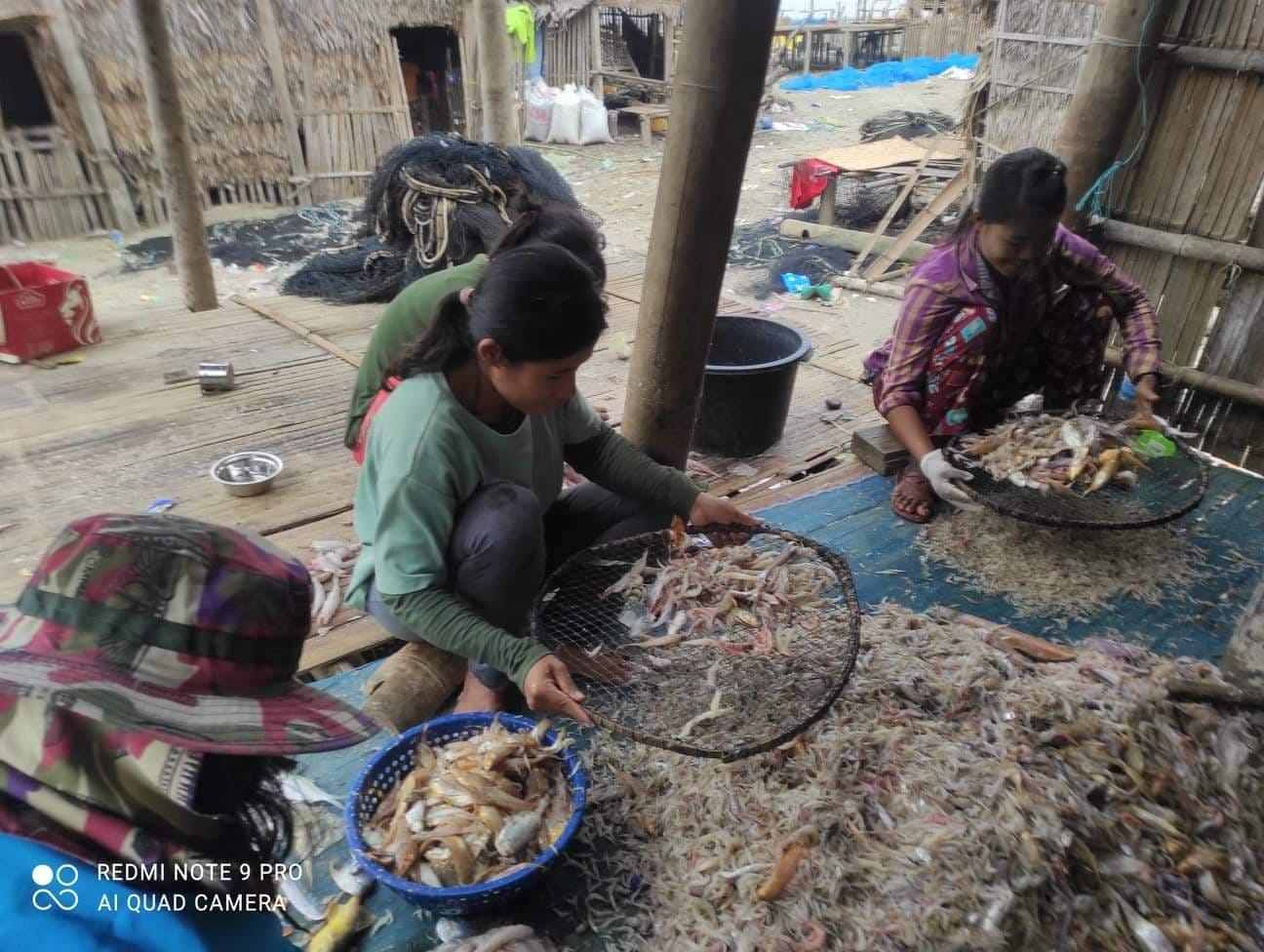
If you're not comfortable answering this question, that's fine, but I want to know with the coup: how has that changed or shaped your outlook as a young person in Myanmar, whether it relates to conservation or not.
Y: It affected me a lot, the coup. First, pushing down our inspiration on working in conservation because most of the conservation work has to associate with the government. If we don't affiliate with them, we have to stop the activities. Let's say for our organization, if we don't coordinate or cooperate with them, we have to stop or postpone our activities. That can reduce our inspiration and make our depressed in moving forward in conservation work.
Another thing is, if we have less opportunities, the youths that we work with have less opportunities as well. It affects the communities as well. It affects out work. It has many consequences. It hits us a lot, this coup situation, for education, conservation, health, all of the things.
T: Even though I'm outside, I'm very saddened, among other emotions, because when I was able to work there, it was such a time of blossoming. We were able to do so many wonderful things, harness a lot of energy and passion, and there was a lot of promise moving forward. It was pretty devastating to feel like all of that work might be lost.
So I want to really emphasize how impressive it is that you and the others at MCCL have continued to do the work you do. When I talk to people, they often ask, "How is the team in Myanmar?" and I say, "They're working really hard, they're doing a lot." People are really impressed that you are all able to do the work that you do under extremely difficult circumstances.
Y: In this case, I am thankful to communities. Because I built trust with them, we trust each other, and they let us do activities without coordinating with the government. Because of this opportunity, we can implement these activities.
T: And that's been the approach of most groups working on the environment in Myanmar, I think, is shifting to that local, village focus and not having to work with government agencies. And that is something that is better when you have a good relationship with the villages!
I want to ask, as someone who didn't have a degree in biology or zoology, who didn't have a formal technical background in conservation, what helped you gain confidence in your ability to contribute to the field?
Y: My confidence came from experience as I worked. Even though I don't have a formal background in biology, I had a chance to participate in doing some research. And with that research, I can lead in some role, take some responsibility in some role. And that makes me confident to talk and confident to lead. Learning by doing made me confident, brings me confidence. For me, everything I learned by doing. I learn and I apply it.
T: That's an important point, because a lot of times in university, there's pressure to pick a major department that doesn't match with your passions. I'll be interviewing Thanda later, and she's also someone who didn't come from a formal conservation training background. And I think there's so much that people can do, who are not what we commonly think of as the "main experts" but who actually have skills and expertise and practical knowledge that a lot of trained experts don't have as much of.
Well, thank you so much for your time. This is one of the few meetings we have where I'm ending us on time! But I'm really grateful that you are willing to share thoughts about the context you're working in and your experiences. I think it represents what a lot of small organizations are going through, and I really believe the groups making really important differences are the small groups working locally. So I think a lot of people will be interested to learn from what you shared.
Y: I hope so. Thank you Tara, I'm really glad to be interviewed by you!
ABOUT YIN YIN HTAY
Yin Yin Htay is a Program Officer of Point B Design + Training. Yin Yin is also a Co-founder of Myanmar Coastal Conservation Lab (MCCL). Yin Yin is a graduate of PointB’s 6-month course, Design Thinking for Community Engagement, and has been integrating principles from Design Thinking and Systems thinking into her work with youth and social and science research in Marine Conservation in the Gulf of Mottama. Yin Yin was awarded the Stephen Leatherwood Award at the World Marine Mammal Conference in Spain in 2019. Yin Yin is also a 2020 cohort of “Youth Biodiversity Leaders” under the ASEAN Center for Biodiversity. With 7 years of working experience, Yin Yin leads and supervises youths in the MCCL internship program, facilitates trainings, meetings, and workshops related to community engagement and coastal conservation and participatory research. She leads and applies the Design Thinking approach in research within the Gulf of Mottama Project related to Marine Mammal Conservation, Most Significant Change, and Participatory Evaluation with the MCCL team.

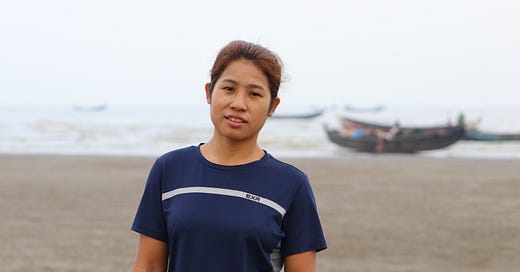



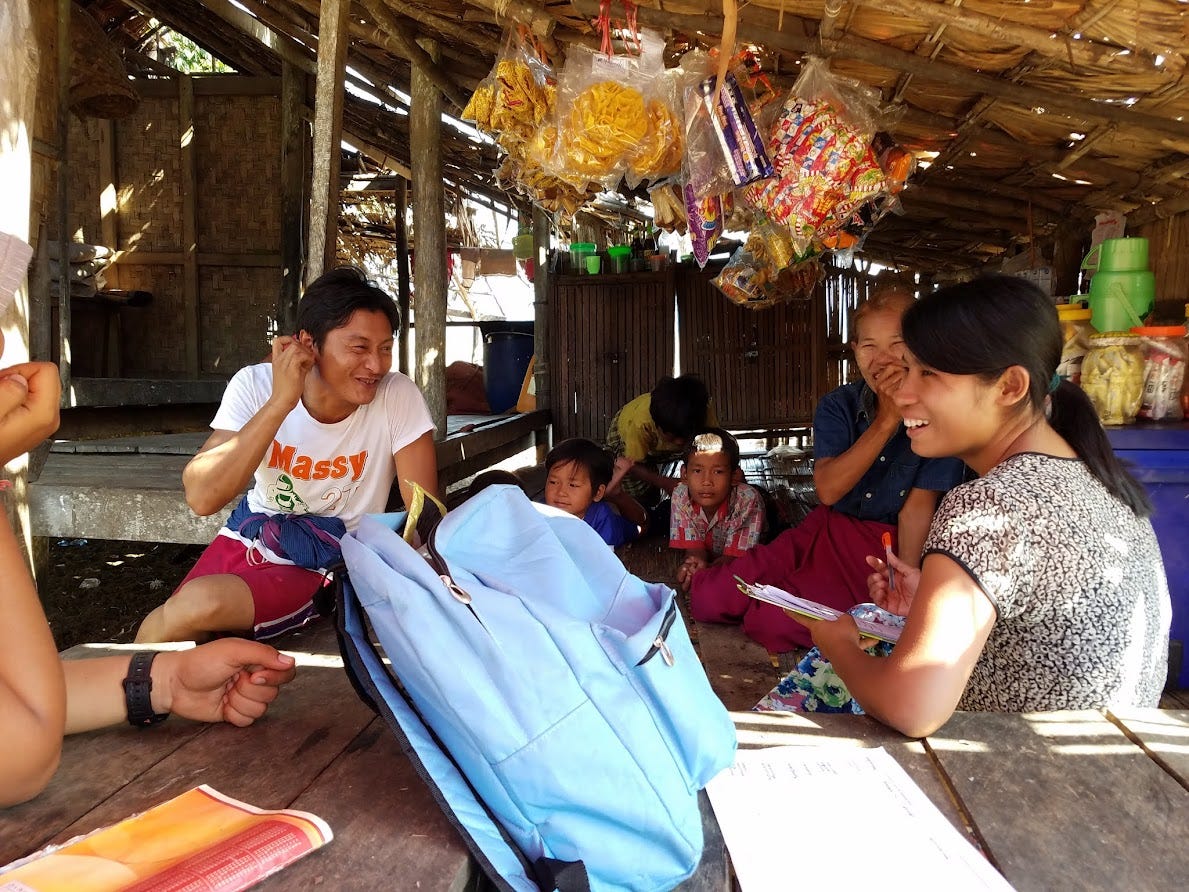

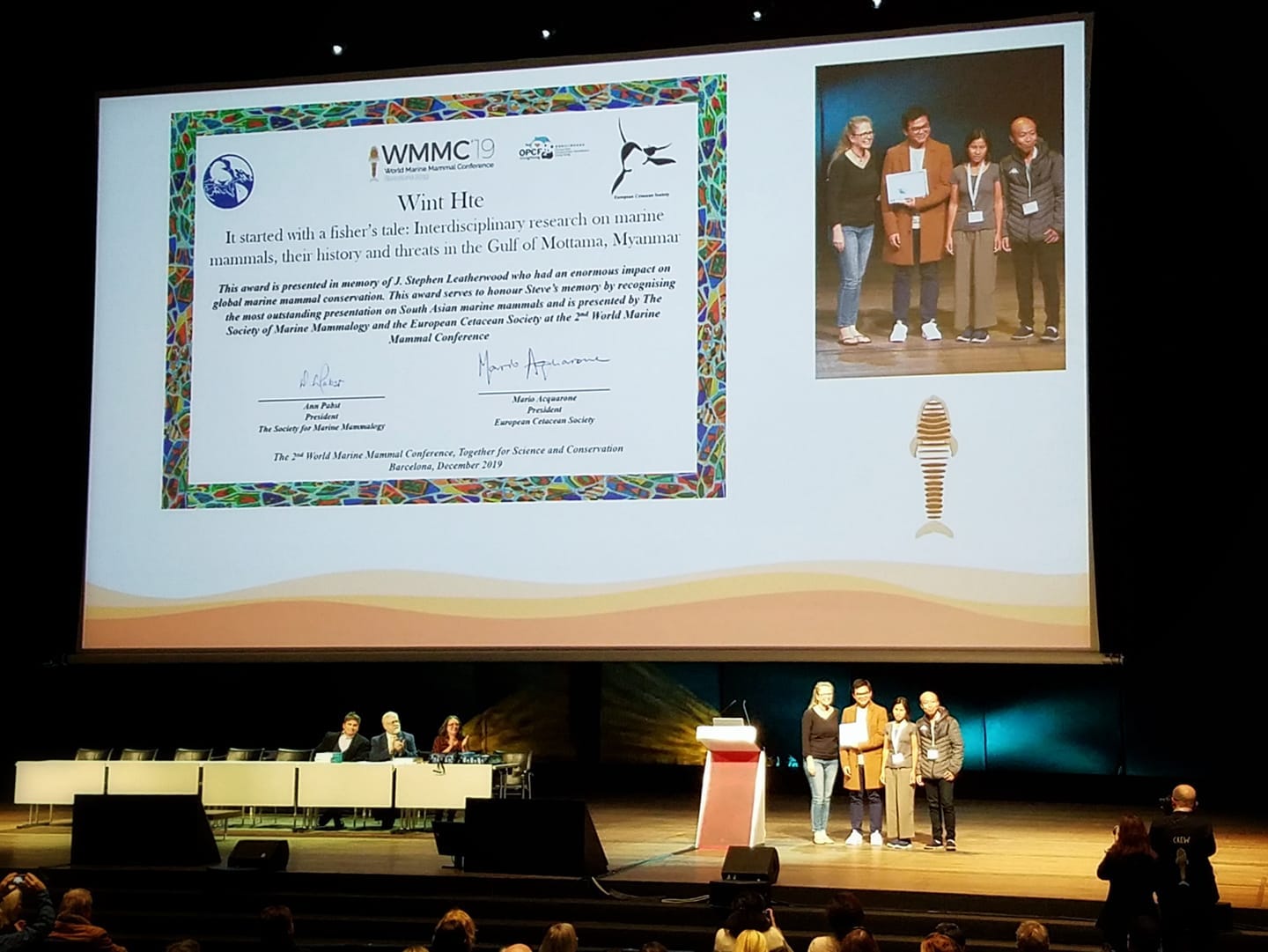



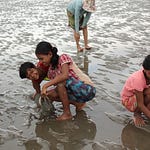
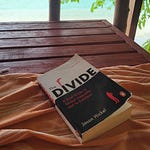
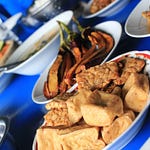
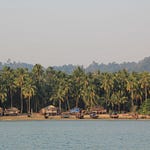
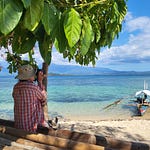

Share this post